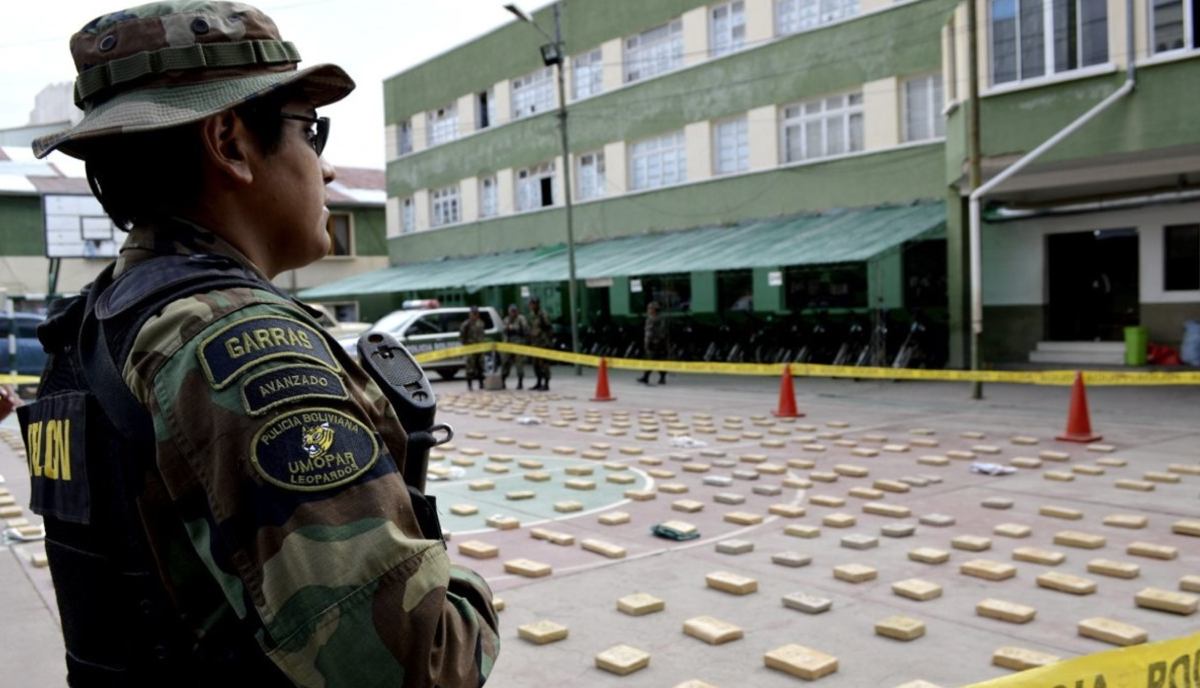Drug trafficking in Bolivia intertwines with a multitude of factors, from transnational economic dynamics to power struggles. It is predominant in current politics and a phenomenon capable of damaging social structures and democracy.
Historic seizures, successful raids, daily confiscations. The Bolivian government is eloquent in its discourse and data on the fight against drugs. But the reconfiguration of drug trafficking and its transnational scope weigh more heavily than rhetorical optimism and records.
As the third largest coca producing country in the world—after Colombia and Peru—Bolivia has been under constant international scrutiny and as of last year, it has been facing an internal dispute within the ruling party, which is using drug trafficking as a banner. The attacks by former President Evo Morales on his successor Luis Arce are not mere comments on poor management; they are direct accusations of alleged protection of drug traffickers operating in the country.
Expansion of organized crime
According to official data, cocaine seizures increased by 62% in 2023 compared to 2022, which may suggest efficiency in controls, but also a strengthening in production and an increase in corruption and violence. Although Bolivia’s homicide rate is lower than other Latin American countries, there are specific events that have generated concern and greater debate about the country’s anti-drug policy.
Extortion and kidnappings tied to drug trafficking crimes are more frequent and violent, as is the presence of members of highly dangerous criminal organizations like the Primer Comando de la Capital (PCC) and the Comando Vermelho (CV) being confirmed by police authorities.
Adding to the latter is one of the most controversial events of 2023. Prominent Uruguayan drug trafficker Sebastian Marset lived in Bolivia for nearly a year operating freely before he fled the country after a failed police operation. A more recent case was the capture of Brazilian Máximo da Fonseca in February this year. Da Fonseca had been trafficking drugs to Peru, Paraguay, and Brazil for 10 years. The government labeled him a “whale of drug trafficking.”
The reality is that Bolivia has become not only a transit country but also a producer and exporter of drugs. Its strategic location, vulnerable airspace, poor land controls and increasing demand from European and now Asian markets make it an attractive and even mandatory corridor in the region. Drugs transit via clandestine airstrips through Peru and Bolivia and then shipped from Brazil and Paraguay to other markets.
After the slowdown due to the Covid-19 pandemic, global cocaine production surged by 35% between 2020 and 2021 to a record figure and the most significant annual increase since 2016, according to the 2023 World Drug Report by the United Nations Office on Drugs and Crime (UNODC).
Today, drug trafficking is sustained by skilled traffickers who know the old tricks and the power of political connections to reinforce territorial control and supply chains. It is undeniable that this lucrative business has modernized with a more effective transnational structure in terms of routes and technology, and also because small and medium groups can move without needing to belong to large cartels. While illegality advances at a fast pace, institutions marred by corruption are left in doubt.
In the Latin America Political Risk Report 2024, the main risks for this year are led by insecurity, organized crime and drug trafficking. In Bolivia, the lack of institutional integrity, independence of powers and impunity have been evident. A proof of this is that at least thirty police officers were involved in drug trafficking between 2022 and 2023, many of them with criminal proceedings that have not ended in sanctions and even allowed their return to the institution. Despite the facts, the government’s denialist discourse persists: drug trafficking has not penetrated the State.
A joint struggle?
The traditional and medicinal use of the coca leaf has been enshrined in the Bolivian constitution since 2009 and currently, the legal cultivation area is 22,000 hectares. However, the debate has always been open about the amount of production diverted to drug trafficking.
The figures validated by the government are those it handles with its own methodology, contrasting those presented by the UNODC, which noted a 4% increase from 29,400 hectares in 2020 to 30,500 hectares in 2021.
The anti-drug fight in Bolivia has been undertaken under the concept of sovereignty and non-interventionism during the 18 years of ruling of the MAS (Movimiento Al Socialismo) and with the claim of being successful. In 2008, then-President Evo Morales expelled the U.S. Drug Enforcement Administration, accusing it of financing a “failed coup d’état,” and the possibility of this cooperation was never reconsidered.
However, the reconfiguration of drug trafficking requires that the fight against drugs have a more integrative and transnational character, meaning multidisciplinary agreements and coordinated actions between countries. Although the Bolivian government has shown openness to cooperation, it is somewhat contradictory, as official denial of the country’s capacity for drug production and export prevails, as well as the rejection of questions from international organizations calling for greater efforts in the anti-drug strategy.
Questions then arise about Bolivia’s true commitment. Is the fight against drugs a priority for the government? Does it have the capacity to confront organized crime? Can it present itself as reliable to the international community?
Drug trafficking and power
The increasingly radical internal disputes within MAS, divided into two main factions—that one led by President Luis Arce and the other one by his predecessor Evo Morales—seek to delegitimize the anti-drug actions carried out by each administration, in a power game aimed at the 2025 general elections.
Both sides know the weak points well, but also how to evade or minimize the accusations. In the end, it is the same ruling party in an environment that casts a shadow over what could be a true anti-drug policy. Amid the confrontation, the country is increasingly engulfed in violence and the expansion of drug trafficking. How can a state with a weakened democracy tackle this scourge?
*Translated by Ricardo Aceves from the original in Spanish.













